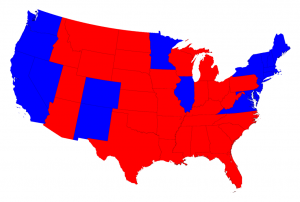 With Republicans in control of the federal government, climate advocates have looked to the states to make progress reducing greenhouse gas emissions. From my perspective, this is a positive and much-needed approach to climate action, given how relatively weak federal efforts on climate have been, even when Obama as president.
With Republicans in control of the federal government, climate advocates have looked to the states to make progress reducing greenhouse gas emissions. From my perspective, this is a positive and much-needed approach to climate action, given how relatively weak federal efforts on climate have been, even when Obama as president.
Progressive states can move much more aggressively and help pioneer policies and programs that can then become a model for the U.S. as a whole. And in the meantime, they can help bring down the costs of clean technologies like solar and electric vehicles, just through their market power. We’ve seen this play out in California.
But ClimateWire reported [pay-walled] that many of these state policy efforts are languishing, particularly the push to implement carbon pricing (through a carbon tax or cap-and-trade program):
Environmentalists have little hope of passing a proposed $35-per-ton carbon tax in New York, where Republicans control the state Senate. Connecticut and Rhode Island both have proposed enacting a $15-per-ton carbon tax, but only after Massachusetts acts. Massachusetts and Vermont both have Republican governors who acknowledge climate change, but are cool to the idea of a carbon tax.
Even in Oregon and Washington, states where the prospects for a carbon price may be best, climate hawks face long odds. Short legislative sessions and entrenched opposition to a cap-and-trade program in Oregon and carbon tax in Washington complicate the outlook for both proposals.
My question is: why are climate advocates focusing on carbon pricing in the first place? Nobody really likes tax increases, and the fight over what to do with the revenue seems to be dividing people. And in the bigger picture, a price on carbon may be less important at this stage of the climate fight than just getting these clean technologies to scale. After all, once renewable energy, zero emission vehicles, and other needed technologies are cheap, a carbon price should be much easier to implement, politically speaking.
I would prefer the focus at the state level be on setting strong greenhouse gas emission reduction targets through law, empowering key state agencies to achieve the targets (as happened in California), and boosting policies that help deploy clean technologies, such as electric vehicle incentives, aggressive renewable energy and energy storage mandates, and energy efficiency standards for new and existing buildings.
Once progress is made on these fronts, these states will have built up clean tech industries and the resulting political will needed to price the dirtier alternatives.


